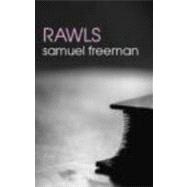
Note: Supplemental materials are not guaranteed with Rental or Used book purchases.
Purchase Benefits
What is included with this book?
| Preface and Acknowledgments | p. x |
| List of Abbreviations | p. xviii |
| Chronology | p. xix |
| Introduction | p. 1 |
| Biography | p. 1 |
| Motivations Underlying Rawls's Lifework | p. 8 |
| Historical Influences | p. 12 |
| Rawls on Justification in Moral Philosophy: Reflective Equilibrium | p. 29 |
| Liberalism, Democracy, and the Principles of Justice | p. 43 |
| The First Principle of Justice: the Basic Liberties | p. 44 |
| Liberty and the Worth of Liberty | p. 59 |
| The Priority of Liberty | p. 64 |
| Some Objections to the Priority of Liberty | p. 72 |
| Summary | p. 79 |
| The Second Principle and Distributive Justice | p. 86 |
| Fair Equality of Opportunity | p. 88 |
| Economic Justice and the Difference Principle | p. 99 |
| Objections to the Difference Principle | p. 115 |
| Fair Equality of Opportunity and the Difference Principle | p. 125 |
| The Just Savings Principle | p. 136 |
| Conclusion | p. 139 |
| The Original Position | p. 141 |
| The Original Position: Description of the Parties and the Conditions on Choice | p. 142 |
| Arguments from the Original Position | p. 167 |
| Conclusion | p. 197 |
| Just Institutions | p. 199 |
| Applying the Principles of Justice: the Four-Stage Sequence | p. 200 |
| The First Principle of Justice: Specification of Constitutional Rights | p. 209 |
| Constitutional Democracy and Its Procedural Requirements | p. 212 |
| Economic Institutions: a Property-owning Democracy | p. 219 |
| The Institution of the Family | p. 235 |
| The Stability of Justice as Fairness Six | p. 243 |
| Stability and the Sense of Justice | p. 245 |
| Moral Motivation and the Development of a Sense of Justice | p. 253 |
| Goodness as Rationality, the Congruence Problem, and the Aristotelian Principle | p. 263 |
| The Good of Justice and the Kantian Congruence Argument | p. 272 |
| Finality and the Priority of Justice | p. 278 |
| Conclusion | p. 282 |
| Kantian Constructivism and the Transition to Political Liberalism | p. 284 |
| Kantian Constructivism | p. 284 |
| The Independence of Moral Theory | p. 310 |
| The Social Role of a Conception of Justice and Problems with the Kantian Interpretation | p. 315 |
| Political Liberalism I - the Domain of the Political Eight | p. 324 |
| The Problem of Political Liberalism | p. 324 |
| A Freestanding Political Conception of Justice | p. 331 |
| Political Constructivism | p. 351 |
| Political Liberalism II - Overlapping Consensus and Public Reason | p. 365 |
| Overlapping Consensus | p. 366 |
| The Liberal Principle of Legitimacy | p. 371 |
| The Idea of Public Reason | p. 381 |
| The Law of Peoples Ten | p. 416 |
| The Law of Nations | p. 416 |
| The Law of Peoples and Political Liberalism | p. 424 |
| Toleration of Decent Societies | p. 429 |
| Human Rights as the Primary Condition of Social Cooperation | p. 435 |
| The Duty of Assistance | p. 439 |
| Distributive Justice and Rawls's Rejection of a Global Distribution Principle | p. 442 |
| Conclusion | p. 455 |
| Conclusion | p. 457 |
| Rawls's Legacy and Influence | p. 457 |
| Concluding Remarks | p. 460 |
| Glossary | p. 463 |
| Notes | p. 485 |
| Bibliography | p. 515 |
| Index | p. 536 |
| Table of Contents provided by Ingram. All Rights Reserved. |
The New copy of this book will include any supplemental materials advertised. Please check the title of the book to determine if it should include any access cards, study guides, lab manuals, CDs, etc.
The Used, Rental and eBook copies of this book are not guaranteed to include any supplemental materials. Typically, only the book itself is included. This is true even if the title states it includes any access cards, study guides, lab manuals, CDs, etc.